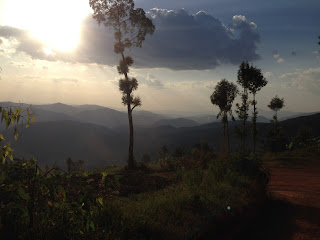By Hester Bentil
From my last blogpost, I promised to tell you more about my wonderful and resourceful friend Eddie Oketta (EO) who currently manages three businesses in Gulu, Northern Uganda. As much as I want to inspire you by telling you his story, I don’t want to miss the opportunity to share some of my significant moments while in Uganda.
From my last blogpost, I promised to tell you more about my wonderful and resourceful friend Eddie Oketta (EO) who currently manages three businesses in Gulu, Northern Uganda. As much as I want to inspire you by telling you his story, I don’t want to miss the opportunity to share some of my significant moments while in Uganda.
As the saying goes, “everything that
has a beginning has an end.” All too soon, I am at the tail end of my summer
internship. Though challenging, it has been a great learning experience. While in Uganda,
I had the opportunity to interact with senior business leaders and influential
people, including the Senior Presidential Advisor on African Growth and
Opportunity Act (AGOA), Commissioner for External Trade, Ministry of Trade which
has been a great leadership development experience for me. You will agree with
me that interacting with all these professionals require mental curiosity and
the skill of asking intelligent questions while exhibiting high ethical
standards. Having the opportunity to interact with these leaders and
establishing great relationships has been deeply gratifying.
Let me give you a background into AGOA and Ministry of Trade. AGOA is a non-reciprocal trade preference program that provides duty-free treatment on U.S. imports of certain products from eligible sub-Saharan African (SSA) countries. The Ministry of Trade on its part facilitates trade transactions in Uganda. As part of my field research, I needed to engage with senior leaders of both institutions to gather credible information. Below are some pictures for my repertoire!
 |
| Hester and Senior Presidential Adviser of AGOA, Uganda |
 |
| Hester engaging the team at Ministry of Trade, Uganda |
Engaging with the only lady carpenter
in Kampala (an entrepreneur currently awarded a Mandela Washington Fellowship
for African women leaders to study in the U.S.A, and represented her country on
CNN as a woman entrepreneur) has really been a humbling learning experience for
me as a woman. With an IT background and deep experience in the creative
industry, she spends most of her time teaching and mentoring others as a way of
giving back to the community. She is famously known in Uganda for her luxurious
high quality furniture and accessories.
 |
| Hester and the Entrepreneur |
It may seem all fun, but like I did mention earlier,
challenging at the same time. One of the challenges had to do with communication gaps which existed due to the language barrier (Nancy
Kasvosve, my fellow intern, you are not alone in this). Due to the historical war
in Gulu, most of the indigenes had no opportunity to complete their education
pursuits, a situation that has partly contributed to their inability to
understand and speak English fluently. This made communication with some
individuals (other than those in the formal sector) a bit challenging. The
worst case always happened anytime I went to the market to shop for food
ingredients - I was constantly faced with a communication barrier particularly
with impatient sellers, thus spending a greater part of my time on translation.
Such a pain!
I didn’t want to end my stay without showing off my
WDI-Summer internship cute flag and how athletic I am. I guess, I may be fit
enough to compete in the next Olympic Games! As my slogan goes, once an athlete
always an athlete!
 |
| Confidently showing off |
 |
| Business Director of TMP helping out for a great capture |
 |
| An attempt to touch the sky! |
You can touch the sky too. I hope you enjoyed reading!



























